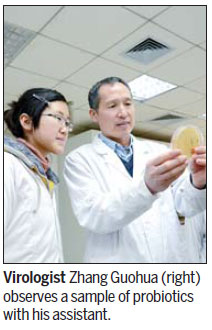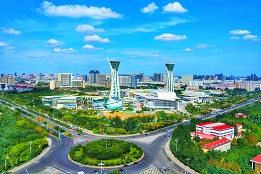Incubators help nurture startups so they thrive
Virologist Zhang Guohua decided to base his bioscience business in Weifang High-Tech Industrial Development Zone after he visited the public service platform in the Weifang Biomedical Industrial Park in 2011.
Zhang, chairman of the board of MGD Biotech Co, said that the service platform has all the necessary equipment and facilities required to turn research results into reality. For instance, it includes a business accelerator, pilot platform, academic communication center and facilities to attract and retain talent. The zone also provides financing, tax and legal services to companies based on their needs.
The development zone is making a name for itself among high-tech businesses in China for its well-established innovation support.

"Businesses need support in their initial stages. The zone is a well-equipped support platform which can save millions of yuan for startups," Zhang said.
The zone's Weifang Biomedical Industrial Park has 93 businesses in incubation programs, and in the past few years, 32 companies have successfully completed incubation programs. It is also home to 17 large-scale businesses, including Wohua Pharmaceuticals and Top Sunshine Group.
The development zone has four national-level and three provincial-level business incubators to support the development of high-tech companies. Nine technological service platforms have been developed to support industries such as optoelectronic and bio technologies.
Apart from Weifang Biomedical Park, the zone is also home to Blue Wisdom Valley and Software Park Mass Entrepreneurship Space.
"Our goal is to foster leading innovative individuals and companies," said Ma Xiangkun, deputy director of the human resources department of the zone's Party Working Committee.
The local authorities established a talent service office in the Administrative Service Hall of the zone to provide consulting and program application services to talents.
Supporting policies to provide residences, health services and education for their children have been introduced to retain expertise.
"All those are necessary to attract talent," said Hou Peng, director of the talents service office of the zone's human resource department.
The development zone introduced a new talent-support plan in 2016 to provide more financial support to talent.
"We want to strengthen the zone's ability to attract talent with our supporting policies and premium environment for talent development," Ma said.
The zone invested 1.8 billion yuan ($270 million) to develop a technological financial service park that boasts 147 financial institutions.
The zone has exhibited strong vitality in recent years thanks to such policies.




